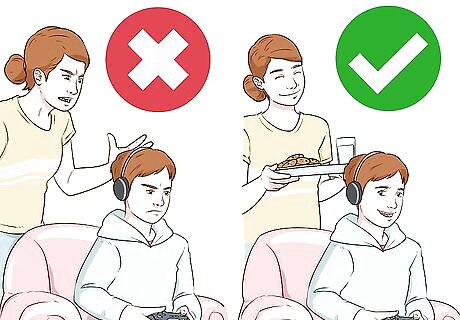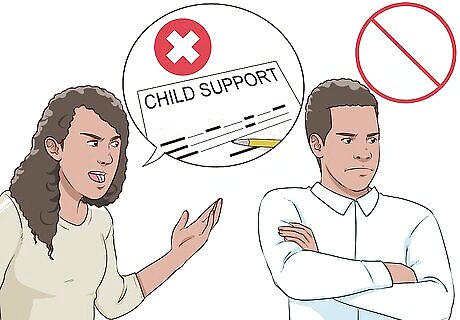
views
Examining Your Feelings

Examine your ambivalent or uneasy feelings. If you are insecure about yourself or your attachment to your spouse, the problem with the ex may really be an issue about your own insecurities. Reflect on why you feel uneasy about your spouse’s ex and figure out the root of the problem. For example, you may be worried that your spouse still holds a flame for their ex, or that the ex still has a chance. If so, look at the situation more realistically so that you can let go of these feelings. Understand that relationships with an ex in the picture are often complicated, especially if there are children from the previous relationship. This is especially true if there are disagreements concerning the upbringing of the children. Complicated does not necessarily mean unhappy, however. Some people make the mistake of thinking "true love" means no complications, but this is an unfortunate myth. You can be happy with a person with complex and even difficult relationships with others, but it will take patience and understanding. Depending on the situation, you may have to decide on whether or not you can manage such a relationship. Even if you think a person is great, you may decide to end the relationship because you cannot deal with the drama of the person's personal life.

Decide if you have trust issues. Your feelings about your spouse’s ex may be related to your trust issues. Remind yourself that your spouse married you, and they wouldn’t have done that if they still wanted to be with their ex. Trust your partner. If there are issues of trust, now is the time to sort them out. You may have had a bad experience in the past in which an ex did something to you that hurt you. Tell yourself, “This is not the same situation. This person is not the same person.” You may be influenced by someone else's loss, such a parent, a TV personality or a celebrity. Keep reminding yourself that other people’s experiences are not your own.
Analyze any jealous feelings that you’re experiencing. If you find yourself getting uncomfortable when your spouse interacts with their ex or talks about their ex, then you may be harboring jealousy. If you realize that you’re having jealous feelings, try to remember that your spouse had a previous life that was not connected to you. Address the insecurities you have about your relationship with your spouse. When you feel confident in your relationship, then feelings of jealousy go away.

Talk to your spouse about their ex. You should have a conversation with your spouse about their ex. You should talk about the ex’s role in your spouse’s and children’s life, and then discuss the spouse’s relationship with the ex. You should also be honest about your discomfort and feelings. This conversation can help both of you find a good way to approach the ex situation. Establish boundaries to minimize your interaction with the ex by filtering all communication through your spouse. If you have an ex too, this is a good time to discuss your spouse's feelings about your ex.
Moving Forward

Accept the situation. You cannot change that your spouse has an ex-partner. Even if you're in a situation where the ex is being uncooperative, accept that there's nothing you can do. Just try to ignore them and stay pleasant whenever you're with them. The best way to combat immaturity is by ignoring it. If they don't get a reaction, then they are likely to give up.

Avoid dwelling on the past. It's likely that your spouse wants to move past the choices they made, so dwelling on the past relationship will never help. If you nag about the ex, it might be an unhealthy stumbling block. Leave the past behind you. Focus on forming a more positively-oriented future belonging to both of you. Focus on making your time together meaningful and good, so that your positive memories start to crowd out the ex memories.

Learn to be happy. Focus on the present and your marriage. Be grateful that you and your spouse found each other. Be glad that you are both happy. Don't think of yourself as the "second wife" or the "third husband". You are simply your spouse's husband or wife, and they are yours. It's as simple as that. Keep it simple and sweet and you'll keep your marriage a happy and enduring one. Remember, it took your spouse’s entire life’s worth of experiences to bring you two together. Be grateful for every single experience in their past because it all led up to you two being together. To strengthen your marriage, set aside time to go on dates and spend quality one-on-one time together.
Dealing With Difficulties
Let your spouse be the primary parent. Often, it is difficult for children to accept a new adult telling them what to do. If your spouse has children from their previous marriage, allow your spouse to set the rules, expectations, and consequences while you reinforce them consistently. When problems arise, involve your spouse and present a united front to the children. Over time, and as the children get used to the consistency between you and your spouse, your spouse will no longer need to be the “primary parent.”

Allow time to develop a relationship with the children. Treat your spouse’s kids with love and respect, even if they don’t treat you this way. However, don't try to act like the biological parent. They will develop a relationship with you if given time and space. Let the children set the pace. Remember that the children may be loyal to the ex and feel betrayed by the new marriage at first. Don’t force the children to choose, and let them work through the feelings. Keep in mind that children view marital breakups differently than adults. Invite the children to talk about their feelings and do not be offended by what they say. If the children are old enough, let them know that you are not there to replace their biological parent. For example, If you’re their stepmom, try saying something like, “I’m not a replacement for your mom, and I never will be. I just want to be there for you as a second mom or a really good friend.”

Try to make things work. If everyone involved wants to try to get along, make an effort to be cooperative. Realize that your spouse's former partner is a human being. If they are making an effort to treat you with respect, you should do the same.

Avoid resenting your spouse for having to pay child support. You should understand that when you share your life with your spouse, you accept all of their baggage as well. Try to think of the child support as a bill that one of you acquired, but both of you accept and pay together, like a credit card. If you think that the ex is greedy or getting more than they deserve, be very careful about how you broach the subject with your spouse. It may be better to speak indirectly about the costs and let your spouse reach their own conclusions.

Talk to a marriage counselor. If you can't stop obsessing about your spouse's ex, it's time to speak to someone who can counsel you about your obsessive thoughts. You may want to go to counseling alone, or you may want to go with your spouse so you can work through the issues related to the ex.
Involve a family therapist. If the relationships you have with the children are weak, or if you and your spouse are not able to present a united front, consider involving a family therapist to help with relationships between everyone in the family. This is especially helpful when there are multiple children in the family who have different reactions and behavior patterns in response to a new “parent.”
Navigating Marriage with a Widow/Widower

Accept the past. If your new spouse is widowed, it may be difficult to adjust. You may feel you can’t live up to the previous spouse, and your partner may still be grieving. Instead of ignoring the past, accept it. The previous marriage was part of your partner’s life and they will probably grieve for a long time. Talk to each other about what you are feeling, both good and bad. For example, encourage your partner to share their grief with you. This helps build a deeper and stronger relationship between the two of you. Talk to your spouse about your feelings. If you feel insecure or worried because of the past, talk to your partner about it.

Accept that your partner will always love their dead spouse. Most people who are widowed never stop loving their dead spouse. That doesn’t mean that you and your spouse can’t have a meaningful relationship. Let go of any jealousies or ill-feelings towards your spouse’s previous partner and accept that they will always love them. However, remember that your spouse loves you and that the two of you are now building a life together. Your partner’s previous marriage doesn’t change the way they feel about you. It can take some time to adjust to this idea, but eventually you will learn that your partner loves you while still loving their dead spouse. Don’t try to be like the deceased spouse or do the things they did. It can be a healing experience to observe past traditions, for example, but check in with your spouse first. Your spouse may want to keep some traditions or activities alive, or they may not want to because it’s too painful for them.

Discuss which old possessions should be kept. Your partner may want to keep possessions of their dead spouse, and you may not feel comfortable with keeping them. Have a conversation in which you both explore why you want to keep or discard the items. Then, come to a compromise about how to handle the situation. For example, you may agree to keeping all photographs and a box or two of mementos as long as your partner donates other possessions to charity. It’s best to not not force the issue. Try offering ideas that minimize the stress for both of you. For example, keep the deceased spouse’s items in a room that you can avoid or pack them in a way where they are not a constant reminder. Then, agree to revisit the issue after a year or so.

Set boundaries with compassion. Though you want to be empathetic to your partner’s grief, you also have to think about your own feelings. When your partner says or does something that hurts you, talk to them about it. Set up boundaries about what is appropriate and what isn’t so that both of your needs are being met. For example, if your partner refers to their previous spouse as “my first wife or husband” or simply “my partner,” that can cause you to feel hurt, unappreciated, and insecure. Tell your partner, “I understand that you’re grieving and you still love your dead spouse, but these comments hurt me.”

Focus on the present. Instead of living in the past with the dead spouse, focus on the present and making a future together. Make new memories with your new spouse. Do new things together that neither of you have done in the past. Try new hobbies, visit new places, and eat new foods. Consider redecorating your home or buying a new one. This can help it feel like your home, not a home from the past.




















Comments
0 comment